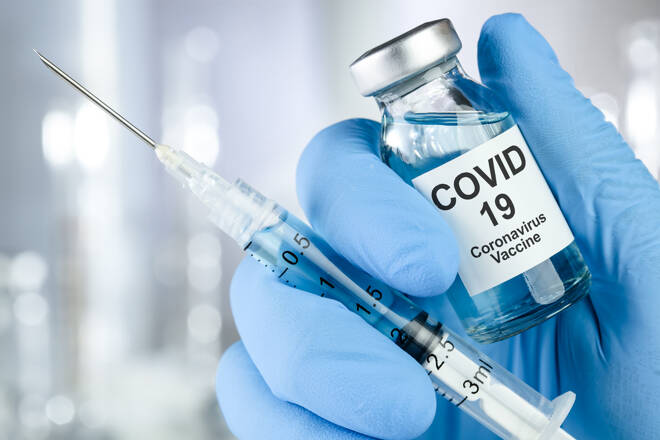Advertisement
Advertisement
COVID-19 Vaccine Update – FDA and the Moderna Inc. Vaccine Review Next Up
By:
Moderna Inc. and the FDA will be in focus, with AstraZeneca also in search of approval in the UK this week.
The Latest
With the BioNTech/Pfizer Inc. vaccine rolling out across the U.S, Moderna Inc. was also in focus in the early part of the week.
The FDA reported that reviewers found Moderna Inc.’s vaccine to be safe and effective ahead of the FDA decision on the EUA submission.
On Tuesday, the FDA affirmed Moderna Inc.’s high efficacy rate, declaring the vaccine to be 94.1% effective.
The Moderna Inc. approval process is a material one, with Moderna Inc. continuing to estimate the production of 20 million doses over the remainder of the year. When considering the fact that only 2-weeks remain before the end of the year, 20 million doses is a high number.
More impressively, Moderna Inc. is also aiming to 1 billion doses annually, with the support of Italian healthcare solutions provider Lonza.
On Thursday, the FDA is scheduled to meet in order to decide on whether to approve Moderna Inc.’s EUA.
In contrast to the BioNTech/Pfizer Inc. vaccine, however, the Moderna Inc. vaccine has yet to be approved elsewhere. The U.S will, therefore, be the first to administer the Moderna Inc. vaccine.
From the UK, news of allergic reactions to the BioNTech/Pfizer Inc. allowed the FDA to advise hospitals and healthcare centers to prepare for any adverse allergic reactions.
With the Moderna Inc. vaccine also an mRNA vaccine, the previous advice could also be issued.
What’s next?
For the U.S, assuming that the FDA approves Moderna Inc.’s vaccine, another large scale vaccination project will get underway.
The combined doses of BioNTech/Pfizer Inc. and Moderna Inc.’s vaccines will come much closer to the CDC’s phase 1a priority group.
This would then allow the vaccination of phase 1b and 1c groups before the end of the winter.
Other nations that had pre-ordered the Moderna Inc. vaccine included Japan (50 million), the UK (5 million), and Canada (56 million). Canada is reportedly expecting to receive 168,000 doses of the vaccine before the end of the year.
For the EU, however, the EMA was not scheduled to review the BioNTech/Pfizer Inc. until mid-January. Pressure has reportedly risen on an EU vaccine approval, however, as member states reintroduce lockdown measures. This week, news has hit the wires that the EMA plans to review the vaccines by 23rd December. Approval would mean that high priority groups could begin receiving vaccinations before the end of the year.
According to the EMA website, the CHMP is now due to hold an exceptional meeting on 21st December.
Once the CHMP recommends marketing authorization of the BioNTech/Pfizer Inc. vaccine, the EU Commission will then fast track its decision-making process in order to grant marketing authorization in all EU and EEA Member States within days
Vaccine doses are in short supply, however, so mass vaccinations are not to be expected until late into the 1st quarter, at the earliest.
The Latest COVID-19 Numbers
At the time of writing, the total number of confirmed COVID-19 cases stood at 73,803,320. The total number of U.S cases has risen to 17,143,779 with the total number of related deaths rising to 311,068.
Things are not much better in other parts of the world, as new cases continue to spike.
This continued rise in new cases has led to a reintroduction of lockdown and containment measures.
For this very reason, the EMA has revised its vaccine review timetables to be more aligned with other developed economies
Other Pharmas
With the BioNTech/Pfizer Inc. vaccine now in circulation and Moderna Inc.’s vaccine imminent, there will be a need for more, however.
To ease production capacity pressures, a single dosage vaccine remains out of reach at present. Pricing pressures also mean that many governments will not be able to vaccinate entire populations.
Therefore, the race for a cost-effective, single-dose vaccine will continue.
AstraZeneca and the University of Oxford are also hoping for their vaccine to receive approval British before the end of the year.
According to news reports, the UK drug regulator, the MHRA, is due to approve the vaccine. There is some uncertainty, however, on whether the MHRA will approve the 1-and-a-half dose or 2 dose vaccine. Efficacy rates were 92% and 62% respectively.
The Global Financial Markets
On Tuesday, Moderna Inc.’s share price slid by 5% on the day. The slide came in spite of the FDA’s likely imminent approval.
This week, AstraZeneca’s share price also hit reverse on news of plans to purchase Alexion for $39bn…
While Pfizer Inc. also saw its share price fall on Tuesday, Johnson & Johnson’s stock price rose by 1.01%.
Having lagged the front runners, Johnson & Johnson is now the main contender to deliver a 3rd vaccine to the U.S.
Both Johnson & Johnson and AstraZeneca vaccines will need approvals, however, to have any viable chance of bringing an end to the COVID-19 pandemic.
For the major indexes, the continued progress towards multiple vaccines has allowed the markets to look beyond the latest COVID-19 numbers for now.
Key in the coming weeks will be the timelines for approvals, however, and production estimates.
About the Author
Bob Masonauthor
With over 28 years of experience in the financial industry, Bob has worked with various global rating agencies and multinational banks. Currently he is covering currencies, commodities, alternative asset classes and global equities, focusing mostly on European and Asian markets.
Advertisement
